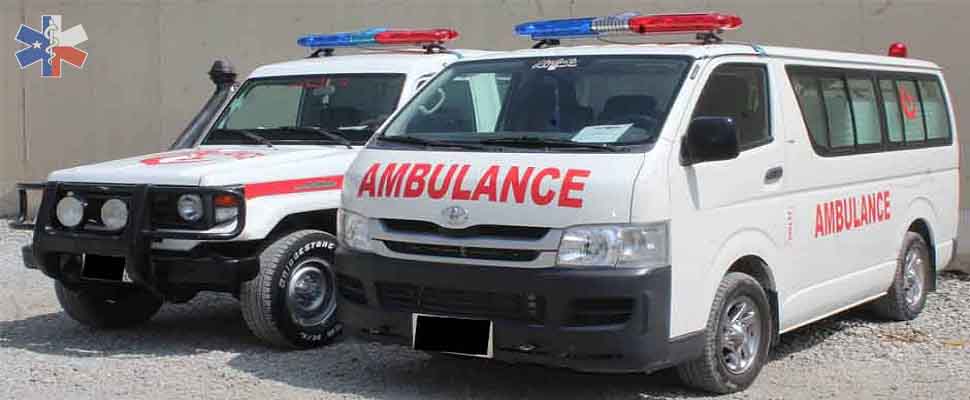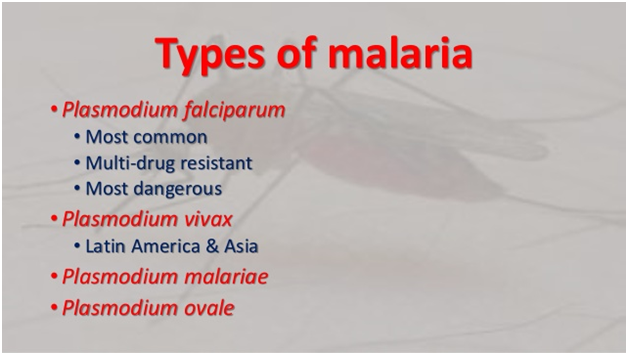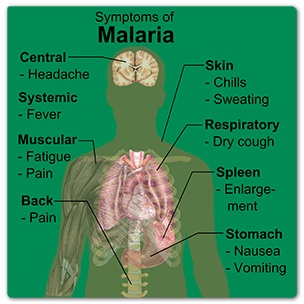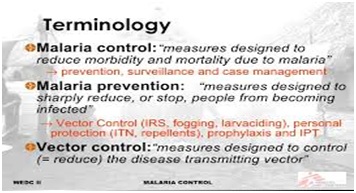
Malaria in Afghanistan
Malaria
Malaria is a parasite that can live inside a female Anopheles mosquito. This is the only mosquito that can transmit human malaria. There are approximately 3,500 species of mosquitoes grouped into 41 genera. Of the approximately 430 Anopheles species, only 30-40 transmit malaria (i.e., are "vectors") in nature. Differently from the human host, the mosquito host does not suffer noticeably from the presence of the parasites.
Once the parasite enters the body, it lives in the liver where it multiplies 10,000 times in the liver and enters the blood stream where in begins infecting red blood cells. Once malaria is in the bloodstream the mosquito is able to pass the parasite from human to human while having a blood meal which is necessary for its reproduction. By personal protection against mosquito bites, this blood meal can be denied, leading to reduction in mosquito eggs and hence mosquito population.

Two weeks after entering the body, the parasite leaves the The MOPH has stated that Afghanistan is acutely prone to malaria due to its tropical climate, paddy fields, poor waste management and other environmental factors.
The principle malaria season is May through November. The entire country of Afghanistan is at risk for malaria except for areas 2250ft above sea level. However, there some areas such as Bamiyan that have cases of P. vivax.

There are more than 100 species of malaria parasite. The most deadly of strains is the P. falciparum which is showing resistance to the traditional treatment of chloroquine. We are seeing resistant P. Falciparum coming from Nangrahar, Laghman and Kunar provinces.
For P. falciparum infections acquired in areas with chloroquine resistance, four treatment options are available. The first two treatment options are atovaquone-proguanil (Malarone) or artemether-lumefantrine (Coartem). These are fixed dose combination medicines that can be used for non-pregnant adult and pediatric patients.
Coartem and Malarone are available at Westex Medical Services. We have seen a few patients coming in from Jalalabad with strains that are also resistant to Coartem which leaves only Malarone. We have been bringing Malarone in from outside the country at this time and the cost is quite high so we keep a limited amount in stock in an effort to keep the stock rotating.
Surviving malaria is dependent upon early recognition and treatment.

Early signs and symptoms include
· shaking chills that can range from moderate to severe
· high fever
· profuse sweating
· headache
· nausea
· vomiting
· diarrhea
Progressive signs and symptoms include
· anemia
· muscle pain
· convulsions
· coma
· bloody stools
Life threatening signs and symptoms include:
· swelling of the blood vessels of the brain, or cerebral malaria
· an accumulation of fluid in the lungs that causes breathing problems, or pulmonary edema
· organ failure of the kidneys, liver, or spleen
· anemia due to the destruction of red blood cells
· low blood sugar
The best way to treat malaria is to prevent malaria.
· Use of preventative anti-malarial medication
· Sleep under a mosquito net. (The Anopheles mosquito bites primarily between the hours of 2100 and 0500 which makes sleeping under a mosquito net an important method of prevention.)
· Insect repellent
· Long sleeved clothing
· Air conditioned or screened quarters
· Prevent water logging, destroy unwanted water collections and keep the water containers closed, sources of egg laying (Source Reduction) can be denied and breeding of mosquitoes can be prevented as mosquitos lay their eggs in stagnant water.
*HIV increases the incidence of clinical malaria and increases the risk of treatment failure.








